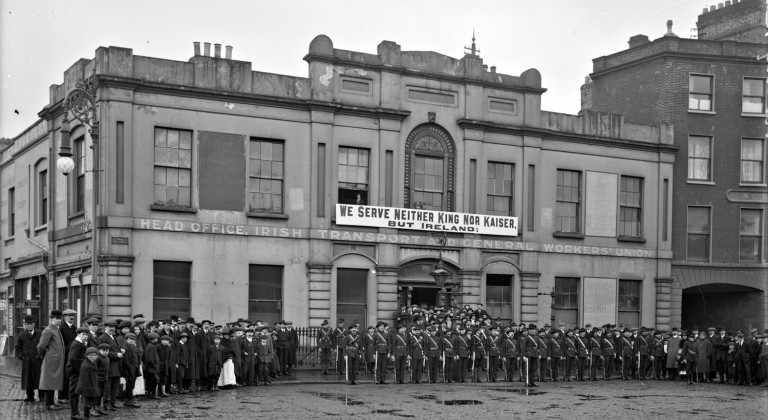This is our democracy. It boils down to political parties arguing over semantics on policy without having any real substantive choice on policies.
I see, hear and read about the hopes of many people for a political change, where many believe that we are on the precipice of a fundamental change in the political landscape, not seen since the days of the Irish Revolution. The hopes and dreams are sincere, and there is a real demand and need for a total shift in Irish politics. However, just changing the faces and names of those in government does not change the power and class relations.
I welcome the downfall of the monopoly of the Big Two—Fianna Fáil and Fine Gael—and I really hope that a progressive coalition can be formed to sit as the 33rd Dáil. That likelihood may be slim, but nonetheless we do have a duty to unseat the Two and vote in those who are proposing to bring about a fairer, equal society, if for nothing else but to expose the nature of the beast.
However, if these parties’ alternative manifestos are fundamentally based on taxation—increase taxes on corporations and the top 1 per cent, decrease taxes on lower-income families—to finance the budgets on public investment they are proposing, then all that hope will very soon be dashed.
Not to dismiss those who support those parties—Sinn Féin, Social Democrats, People Before Profit, Solidarity, Green Party, or even, at a stretch, the Labour Party—but the “alternative” they propose is only an alternative to the management of the actually existing capitalist system, a system in which production is privately owned and run in the interests of a class of people who profit from the exploitation of our natural resources and the labour of people around the globe.
They are all putting Fine Gael and Fianna Fáil on trial—and rightly so—for the debt and austerity that has plagued our country, especially within the last decade; but nowhere have I seen the system itself (capitalism) and the major institution enshrining the system in Ireland (the EU) being even brought up as a talking-point, never mind being the focus of an election campaign as a way of explaining the crisis in our public system, the economy at large, and the planetary emergency that we all face.
I understand why this is the case, because it wouldn’t be a smart electoral strategy if they want to get voted in. However, I don’t believe in or support this electoral fetishism, a shortsighted and futile form of politics, devoid of class analysis. An element of “better being inside the tent than standing outside it” drives this. So, instead of looking at the source and the reason why all these factors have combined to create a real state of emergency, each on their own and collectively, these parties opt to focus on those carrying out the policies, and insist that they would do it differently. They have all successfully avoided the elephant in the room.
This is the folly of our democracy: that we think that changing a government will change the power relations—the class relations of society. Buying into the electoral system and holding it up as the holy grail of democracy has been the greatest weakness in building a strong left movement. Political parties on the left have pushed aside the class analysis and theory informing their practice and substituted for them the centrality of elections. These demands that they make will gain favour and support, but these same policies are in contradiction to the EU rules on competition and state intervention and subsidisation in the market, and are against the interests of capital in maximising profit; yet where is this stated in their manifestos?
In essence, the promise of socialist and social-democratic reforms within capitalism are incompatible with the interests of the actually existing capitalist system, and are illegal under EU rules; and ultimately, so long as no alternative system threatens it, they will not be tolerated by the ruling class and its strata of collaborators.
The electoral campaigns being run by these parties hide this reality, because they are either not willing, do not understand, or do not want to expose the class nature of society and the class struggle that needs to be waged. Possibly contrary to their intentions, this can only strengthen the hand of the triad of imperialist powers in Ireland—the European Union, the United States, and Britain—and weaken the development of a class-conscious workers’ movement.
So I would argue that we need to be outside the tent, because that tent is collapsing and is in danger of suffocating us all. We must use every opportunity to highlight the barbarity, insanity and ecocidal path of the capitalist system. This includes using elections as a means of deepening class-consciousness and broadening our class forces. Let’s vote for all those who promise to promote the people’s struggles, but let’s not be seduced by the idea of changing the system within the Dáil, and be conscious and vigilant of false promises.
To change the system means to struggle outside government, to build the progressive forces, to support the demands of the working class along with the oppressed, marginalised and exploited people, at home and abroad. It means directing our efforts into building collective movements, with common struggles, finding common ground and common cause for uniting and extending solidarity, creating a transformative programme of demands with maximum support.
We must expose those who will try to weaken and undermine this just cause for their own self-interest. The Communist Party of Ireland has taken on that task; and rather than direct resources in elections its focus is on accelerating and expanding our education programme, developing our theory in order to direct our action; and we welcome all those who wish to be part of this process.
There is no alternative and no shortcut in building class-consciousness. We must be guided by the time-tested slogan: Educate, agitate, and organise.






